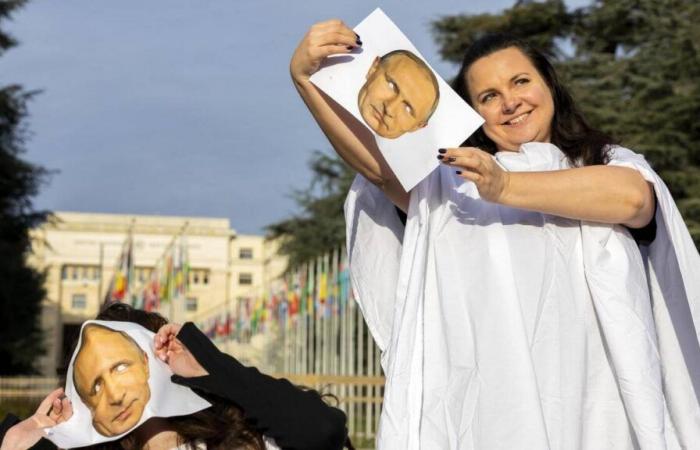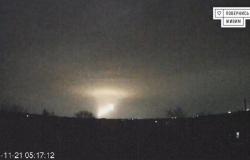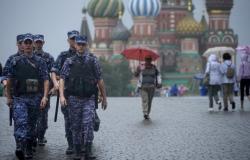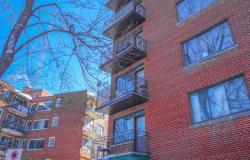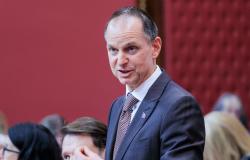The Geneva demonstration, which took place on the Place des Nations, echoed a call for mobilization launched in Berlin by three opponents. Unable to act in Russia, the latter are trying to relaunch a bloodless and divided movement since their exile. They are Yulia Navalnaïa, widow of Alexei Navalny who died in prison in troubled circumstances last February, Ilya Yashin, former Moscow municipal deputy recently released from prison, and Vladimir Kara-Mourza, who survived prison and to two poisoning attempts. A march in which around a thousand people took part was organized in the German capital also this Sunday. In Zurich, a similar demonstration had brought together around fifty participants the day before, including members of the Belarusian opposition.
“Putin is doing his best to create a myth that his criminal war is wanted and supported by the Russians. We refute this. Furthermore, it is not an ethnic conflict but a war between democracy and dictatorship,” explains Véra. The Russia of the future demands the resignation of Vladimir Putin, whom it considers “illegitimate”, his trial for war crimes, the withdrawal of Russian troops from Ukraine, the payment of reparations to this country, justice for all the victims of conflict and the release of political prisoners in Russia. It also calls on the international community to introduce stricter sanctions against the regime of Vladimir Putin and to monitor their implementation. The organizers also point out that Geneva is home to the headquarters of the company STMicroelectronics, whose chips are found in Russian-made missiles and drones.
Geneva seems to me to be a special case, because many Russians established here work for international organizations, embassies, or in the hydrocarbon trade. These are therefore people loyal to the regime.
Some fatigue
By the organizer’s own admission, mobilization was weak in Geneva. For what? “I think there is a certain fatigue, because we cannot find effective ways to stop this war,” answers Véra. “Moreover, many Russians believe that demonstrating is pointless. Finally, Geneva seems to me to be a special case, because many Russians established here work for international organizations, embassies, or in hydrocarbon trading. These are therefore people loyal to the regime.”
Editor-in-chief of the oldest Russian-speaking online newspaper in Switzerland, Nasha Gazeta, based in Geneva, Nadia Sikorsky did not take part in the Geneva demonstration, of which she only learned late. It highlights the lack of support from Western governments for Russians opposed to the war. “Even if I am not on the list of foreign agents kept by the Kremlin, given that I have no activities in Russia, I know that the regime has its eye on me,” explains the journalist, whose media was labeled “Russophobic” by the Russian embassy in Bern following a publication on a caricature of Putin in July 2022. “It’s been three years since I last saw my parents and I don’t know if I want to take the risk of returning to Russia: even though I am a Swiss citizen, work and pay my taxes here, I don’t think the Swiss authorities will or will be able to do anything for me if I get arrested .” According to Nadia Sikorsky, “people in the media, like Yulia Navalnaïa or Vladimir Kara-Mourza, have no problem obtaining the support of Western governments. But other opponents die in Russian prisons. However, not everyone is ready to die for ideas, even those who appreciate Brassens.
Not everyone is willing to die for ideas, even those who appreciate Brassens.
Lack of support from Western governments
The journalist, whose media lost two important sponsors (a Swiss private bank and a private clinic) after she took a position against the war on February 24, 2022, believes that the values advocated by the West are not supported in practice. “One way or another, Putin will win this war and he will not return the occupied territories. Everything will return to normal, but what will become of the Russians who protested? If she does not regret having spoken publicly, Nadia Sikorsky was also struck by the lack of support she received from her compatriots established in Switzerland. “I thought I was speaking for them but I realize today that I was only speaking for myself. It’s a disillusionment.”
Doctor in social sciences from the University of Lausanne, Léa Moreau wrote a thesis on Russian-speaking communities in French-speaking Switzerland. According to her, this weak mobilization can be explained by “a weariness among certain people which leads them to turn away from what is happening in Russia. People also want to detach themselves from all this and concentrate on their lives here because they feel a feeling of helplessness. And in general, we cannot say that the demonstrations organized in Geneva in the past, in particular for the release of Alexeï Navalny, have attracted many people.
* Fictitious first name

